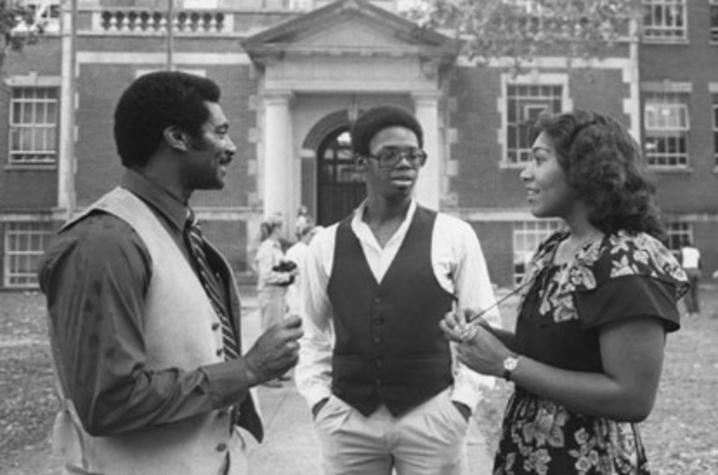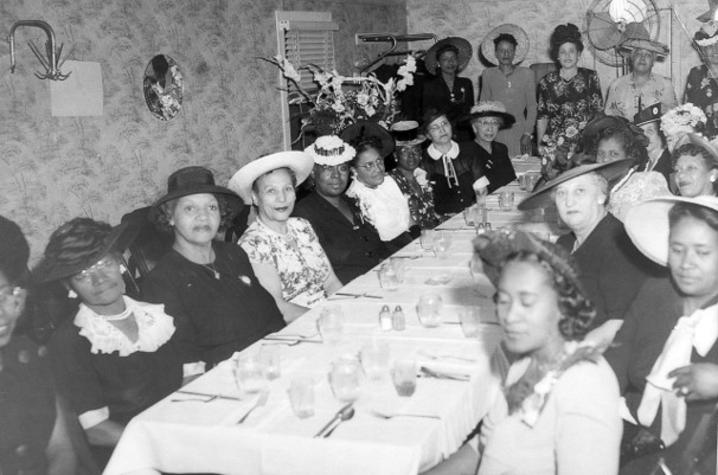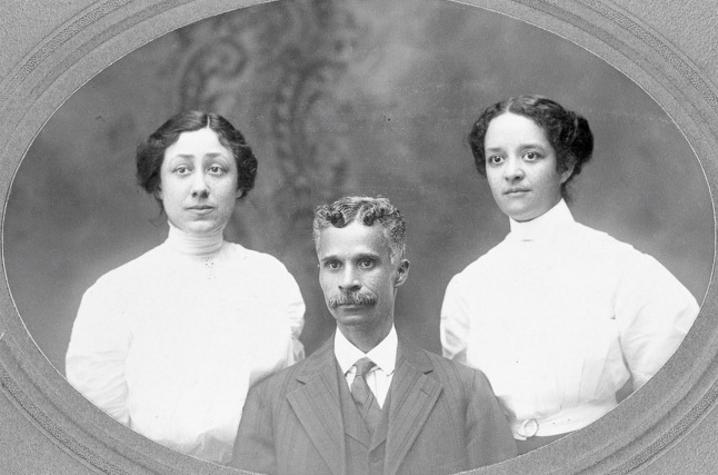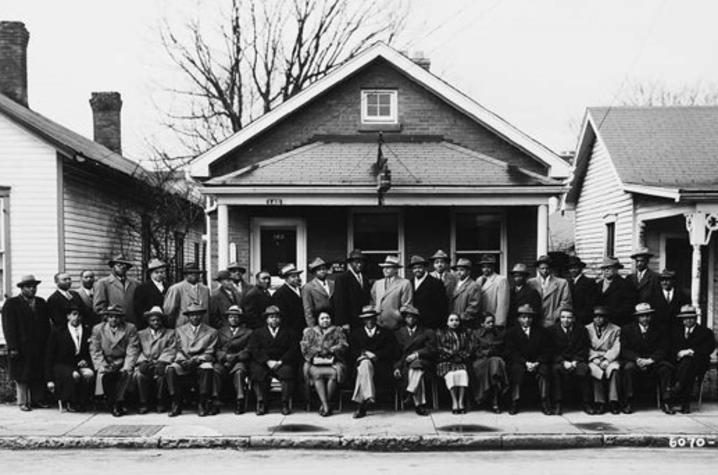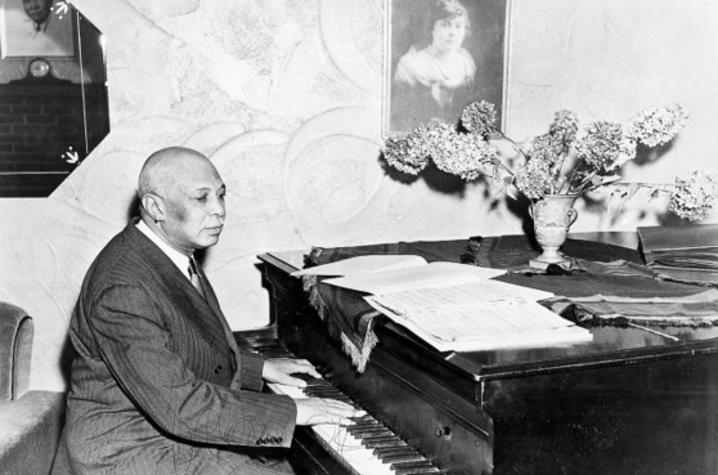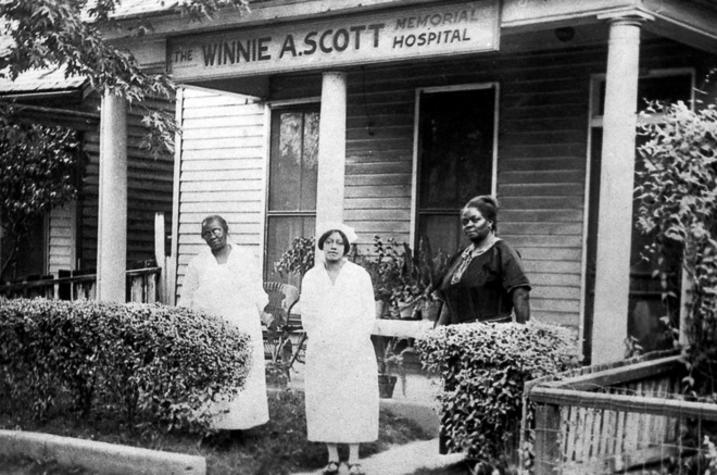UK Database Chronicles the Wealth of Black Contributions to the Commonwealth and Beyond
LEXINGTON, Ky. (Feb. 4, 2021) — For 18 years a one-of-a-kind database has captured the wide-ranging array of contributions Black Kentuckians have made in the Commonwealth and beyond. The Notable Kentucky African Americans (NKAA) Database ensures that generations to come will have access to information on the substantial impact these citizens made on the state's history.
The NKAA Database was introduced in 2003 by University of Kentucky librarians Reinette Jones and Rob Aken. The project’s web pages, which focus on African Americans in and from Kentucky from the 1700s to the present, were developed to bring together names, places, events and sources where additional information could be found. From its inception, UK students, researchers and library patrons far and wide gave the database an unexpected and overwhelmingly warm reception with requests for more content.
Almost two decades later, the NKAA Database continues to grow with new and updated entries and sources that are used by more than 200,000 patrons annually. While the majority of the database’s users are from Kentucky, it has patrons throughout the U.S. and in other countries.
To learn more about this important resource on Kentucky’s history and the obstacles it had to overcome, UKNow recently caught up with Reinette Jones and Rob Aken, its creators and founders at UK Libraries.
UKNow: How did the idea for the NKAA Database come to be?
Jones: For years I had noticed there would be researchers coming to the various libraries asking about African Americans who were supposedly from Kentucky. The names were not any that I had ever heard before. The researchers never seemed to have much success finding what they wanted. So, I started writing the names down and doing my own research, and soon learned that there were other avenues for locating information about African Americans in and from Kentucky.
The idea of NKAA grew from there. Though, for about a decade before it went live, NKAA was not a welcomed discussion because the idea was thought to be a waste of time, no one would use it, and it was not really needed because the UK Libraries already had the best the state could offer. Once NKAA went live, it was not too long after that I was told that I would have to give it away because it wasn’t really needed anymore, and well, that was another discussion. Let’s just say, there were some growing pains.
Aken: I became involved when Reinette came to me in 2003 with the idea of providing information online about African Americans from Kentucky of note. I worked up a website to present the entries, and as Reinette added entries, I modified the website to organize the entries into categories. Over the years, we have worked with others in the Libraries to provide a more sophisticated database structure, and I have taken on the task of editing and maintaining and updating links to related resources.
UKNow: Was it modeled on another resource? Has it become a model for others?
Aken: To the best of our knowledge, NKAA is a unique resource for state-related African American history and biography maintained online as a free resource. We have worked with other librarians who had an interest in creating similar databases for regional coverage in other states, but to date, I am unaware of any comparable resource for other areas. Reinette could address this question more thoroughly than I. Her imagination, research and perseverance are the primary reason this resource exists.
Jones: As Rob noted, the NKAA Database is an original. Back in 2003, when I asked Rob for help, he instantly jumped on board with the idea and outlined the website, and we tinkered and talked until it was ready to go live. As soon as it went public, NKAA started growing faster than either of us had anticipated. We thought we were really cooking with gas when suddenly there were 100 patrons a day using the site.
UKNow: How long did it take to get the NKAA Database up and running?
Jones: I think it took a few months of construction before going live on Sept. 19, 2003.
Aken: The initial listings began in September 2003 with a couple hundred entries. I would say it took maybe a couple of months to set up the organization we wanted and to build the website. Over the years, we have modified the presentation as Reinette has added thousands of entries, sources and side projects (e.g., the African American Library Directors in the USA), and others have become involved in providing more sophisticated structures to support the continued growth and accessibility of the NKAA.
UKNow: What work goes into creation of content and database maintenance?
Jones: Well, once NKAA proved to be a viable library resource used by hundreds of patrons every day, we got better support from the library administration, and darn good help from colleagues in the library, and vital help from community researchers around the state, around the country, and from abroad.
On the other end, UK students and faculty started requesting more information and sources like those listed in the NKAA Database. There had been requests long before NKAA came to be, but that demand has grown to be many times more than what it had been.
Aken: The content creation is almost exclusively Reinette’s work. She does the research for the entries, which may include following directions from folks in the state who, for example, describe the location of a private cemetery in an out-of-the-way location that may require her to put on boots and go slogging along a creek to examine.
Creation of the entries comes from Reinette’s commitment to researching any aspect of the African American experience, contributions, and history in Kentucky or by Kentuckians who have made notable contributions throughout the country and the world.
It should be noted, too, that much of the database has been developed by following up on questions or contributions from patrons and information provided by users of the database — this resource is in large-part a grassroots development, as we learn about many of the notable African Americans recorded in the NKAA from those who use the database: some provide basic information that Reinette then researches and writes up; some write entries themselves or provide the bulk of the information themselves; and other researchers ( e.g., Yvonne Giles of Lexington) provide information.
UKNow: What topics and/or people does the NKAA Database cover?
Aken: I believe the original 2003 database had 10 or so subjects. Many of the entries are about individuals and those activities that have made them “notable,” regardless of why they are notable. Most of the individual person entries do highlight significant contributions involving leadership, celebrity, talent and creativity, often while highlighting a broad range of specific fields of endeavor (e.g., actors, agriculturalists, nurses, physicists, poets). Others make note of significant historical development (e.g., the history of African American education in Kentucky), locations related to Kentucky African Americans (e.g., Nicodemus, Kansas), collections (e.g., oral history collections, many available online through the UK Libraries Special Collections Research Center), and data (e.g., Slave Owners, Slaves, Free Blacks, Free Mulattoes in Kentucky, 1850-1870).
Really, anything that is specifically an aspect of the historical and current African American experience in the state of Kentucky or related in some way to individuals who have a Kentucky connection is included in NKAA. Each entry includes the pertinent subjects related to that entry at the bottom, linking out to other entries in the database that are related to those subjects. And links to video, sound recordings, and photographs and other images are included when available.
Jones: Today, the NKAA Database covers 242 topics from the first African American families to zoologists. There is even a category for “Other,” those scattered topics that are one of a kind, such as comic book collections and African Americans with the first name Kentucky.
You can find all the database subjects at https://nkaa.uky.edu/nkaa/references/subject.
UKNow: Any favorite specific entries or topics covered?
Jones: Nope. Whatever I am working on is my next favorite.
Aken: I agree with Reinette. My work involves going through the entire database, editing entries, updating links and providing updated information when available. I must say that every entry I work on is my favorite at that moment.
There is such a wealth of information here providing examples of fortitude, creativity and contributions to the advancement of the race, the state and humanity in general. There are also historical entries that provide a picture of what slavery and racism have done to our state and country, but also examples of how people of the state have contributed to overcoming this history and continue to work toward overcoming the continuing impact of racism through perseverance and cooperation. Some of those entries include white individuals who have contributed as well to this fight (e.g., John Gregg Fee, founder of Berea College).
I would point out that NKAA has led to requests to use the information (e.g., one year for Black History Month, the Lexington Herald-Leader used one NKAA entry each day to highlight various Kentuckians and their accomplishments). We have also talked with various history and genealogy groups throughout the state about the NKAA, and it also won the American Library Association Reference and User Services Association Award in 2009: www.ala.org/news/news/pressreleases2009/april2009/rusagalecengagewinner.
UKNow: Do you continue to add new information to the database today?
Jones: New information is added almost daily. Contributions come from reference questions, submissions or requests that fill a research gap, such as Black Names in Kentucky or Cabinetmakers.
Aken: I can’t imagine the database would ever be “complete”; issues and individuals continue to develop, and so much historical information is incomplete, there will always be more information that can be added to this ongoing story.
UKNow: What ways have you seen the database used over the years?
Jones: The NKAA Database is used by all grade levels, senior centers, community researchers and genealogists. The database has been listed as a reference source in various publications and on library and school websites. When NKAA was a couple of years old, I found out that parents and community researchers were periodically printing the entire website because they thought it was something that UK was presenting for Black History Month and had not gotten around to taking it down. The fear was that it would not last and would soon be going away. No matter how many times I assured them that was not the case, I just could not say it enough or prove it, so we showed them that it would be around for a while.
Aken: When I worked in Reference, I would perhaps guide a student or other user of the Libraries to entries in NKAA to assist them in their research.
Also, users contact us via email or call to find out more information about entries, and we work with them on their research. Most recently for example, a person who is buying and restoring a house that was (he thinks) designed and built by Samuel Plato in Marion, Indiana, had looked at the entry for Plato in the database, and he wanted to know “how to best retrieve items listed in the NKAA database.” I was able to tell him how to get copies of the material he wanted. The database provides, then, introductory information on the person or topic, but also importantly provides references to information with more detail about the entry — NKAA often serves as a starting point to additional information that exists in other works.
UKNow: Do you have an idea of how many people have used the database?
Jones: The numbers have grown from 100 or so hits per day in 2003 to anywhere from 1,000-4,000 hits per day this year.
This year has really been one for the books, and not just because of the coronavirus and students learning virtually. The life and death events surrounding African Americans in Kentucky and nationally caused major usage spikes. When Breonna Taylor was murdered, suddenly anybody and everybody wanted to know more about the life experiences of African Americans in Kentucky. Who? What? Where? When? How? Why?
UKNow: What do you hope users take away from the resource?
Aken: There are so many ways the resource can be useful to a wide range of users. Younger students learn the breadth of contributions so many people have made to the human race, and they see the history of a central state in the African American experience. They also can find starting points for further research. Scholars can also find sources of information and material specific to the state of Kentucky, a state that has been central to the history of African Americans.
Jones: Kentucky is a state that has a lot of unexplored history. Rob and I will not have enough lifetime to mark down all the noted African American people, places and events in Kentucky. There will always be more. Go find it.
UKNow: Any future plans for the NKAA Database to grow or expand?
Aken: I’m sure Reinette has specific ideas, and I’ll be there to do what I can to help with the expansion. I know it has grown steadily since 2003, and the bulk of that growth is because of Reinette’s dedication, imagination and perseverance.
Jones: For now, it will continue to grow with updates and new information. The final plans for NKAA are still being discussed. It has been fully sponsored and supported by the UK Libraries for almost two decades and is provided to all who have internet access.
NKAA has been extremely well received by the campus and the community. UK Special Collections would be a good resting place for the NKAA Database. We will see where it lands when the time comes.
Aken: I’ve worked on a number of projects in my career, but NKAA holds a special place in my heart. To have contributed in whatever way I can to help Reinette bring her vision together has been one of the highlights of my career. It’s an honor to contribute to such an important resource that touches so many people; I’m grateful for the opportunity to be a part of NKAA.
The Notable Kentucky African Americans Database remains a free online resource for all who have access to the internet at https://nkaa.uky.edu/.
Reinette Jones, who earned her bachelor’s degree in journalism and master’s degree in library science from UK, started out as a member of the university’s Student Financial Aid office before joining UK Libraries Reference team in Margaret I. King Library.
Over the years, Jones has worked in the UK Libraries’ Communications Reading Room, Shaver Engineering Library, International Documents in King Library and with Reference at William T. Young Library. After working with Reference, she transitioned to the Special Collections Research Center’s Louie B. Nunn Center for Oral History, and now serves in Special Collections doing community outreach, reference, and research, and as an affiliate with African American and Africana Studies in the College of Arts and Sciences. In addition to the NKAA Database, Jones also created the research guide for lesbian studies for UK Libraries — one of the most used research guides on campus.
Rob Aken, who holds a bachelor’s degree in English from West Virginia University, came to UK in 1976 to pursue his master’s degree in English and serve as a teaching assistant in the department. While working on his second master’s degree in library science, he worked as a graduate assistant in the King Library’s Reference Department. Aken began working as a reference librarian upon graduation. During his career with UK Libraries, he served as a bibliographer for Health, Physical Education, Recreation, and Dance as well as English; coordinator of the Reference Collection Development; coordinator of Bibliographic Instruction; coordinator of Automated Reference Services; head of Reference; a WWW resources librarian (later web administration librarian, including Research Guides startup and administration; and official representative, Inter-University Consortium for Political and Social Research).
Outside of UK Libraries, Aken was also involved in a variety of first-generation projects, having been a first-generation student himself, and served as a reviewer for Library Journal and Choice. He also developed a Virtual Alternative Media database in conjunction with a Department of Communications faculty member and developed and maintained a website for Radio Eye for many years.
As the state’s flagship, land-grant institution, the University of Kentucky exists to advance the Commonwealth. We do that by preparing the next generation of leaders — placing students at the heart of everything we do — and transforming the lives of Kentuckians through education, research and creative work, service and health care. We pride ourselves on being a catalyst for breakthroughs and a force for healing, a place where ingenuity unfolds. It's all made possible by our people — visionaries, disruptors and pioneers — who make up 200 academic programs, a $476.5 million research and development enterprise and a world-class medical center, all on one campus.





